Peter MALONE
Saturday, 18 September 2021 19:44
Tuff Turf
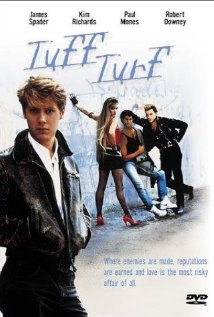
TUFF TURF
US, 1985, 112 minutes, Colour.
James Spader, Kim Richards, Matt Clark, Robert Downey Jr.
Directed by Fritz Kiertsch.
Tuff Turf is one of the many youth films of the early '80s. It is a tough film, showing gang behaviour in American cities. However, it is also a film with some sentiment relying on love and family relationships for resolution of problems. The film captures some of the atmosphere of the times - with an exploitation tough style.
The film was directed by Fritz Kiersch who directed the Steven King story Children of the Corn. Better than average for this kind of film.
1. The focus on youth in films of the '80s? Observation and comment? Exploitation?
2. Small budget, city locations, interiors and exteriors, stunt work and action? The range of songs for the period, background?
3. Youth and confrontation? Individuals? Groups? Peer pressure? Friendship? Gangs? Rumance and violence? The assertion of youth?
4. The title and its tone? The emphasis on toughness?
5. The gang of Tuffs and their techniques? The role of Frankie and the set-up for the robbing of businessmen? The bikie and the aerosol spray? Morgan and his intervention with the Tuffs? Friendship with Jimmy? The clashes, Nick and Frankie, the bashing of Murgan? Nicky going to prison? The stealing of the cars? The plan for attacking Mr. Hiller? His being shot? The siege in the liquor,store and the attack on Frankiels father? The warehouse showdown and fights? A portrait of a gang? Realistic or not?
6. Morgan as hero: on his bike, in black, intervening in the robberies, the aerosol technique? Being anti-Tuff? At home, his successful lawyer brother, his parents, his mother's strong stances, a sympathetic father? Their expectations of him? The background of his being expelled from school and their moving? Friendship with Jimmy? The debts, attraction towards Frankie? Friendship with Feather? The intruding in the Country Club - the taking off of the yuppies? The bashing? The meal at home and Frankie's visit? His father's advice, his father's being shot, the hospital sequences, Frankie's grief? The tough, individual hero?
7. Frankie and her role in the robberies, friendship with Nicky, attraction towards Morgan, the trap, the bashing, the meal at Morgan's home and her reaction about her mother's death, her grief for St. Hiller, her not wanting to marry Nicky, the cause of the attack on her father?
8. The portrait of the parents? Family roles, family influence? Obedience? Pressure and expectations? Violence done to the parents because of the children?
9. Frankie's father, wanting her to marry, the danger and the attack?
10. A picture of contemporary American cities, was the film a-mirror, an accurate observation of human problems, the human face of contemporary problems?
Published in Movie Reviews
Published in
Movie Reviews
Tagged under
Saturday, 18 September 2021 19:44
Taste of Fear
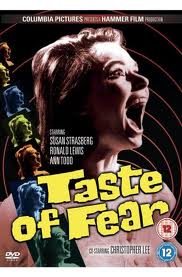
TASTE OF FEAR
UK, 1961, 82 minutes, Black and white.
Susan Strasberg, Ann Todd, Ronald Lewis, Christopher Lee, Leonard Sachs.
Directed by Seth Holt.
Taste of Fear (Scream of Fear) is an entertaining thriller. It goes over familiar material, betrayals, terror, expose. However, it is done with more class than usual. This is a Hammer production, written by Jimmy Sangster, author of so many films from the Hammer Studios. It is photographed by expert Douglas Glocombe and directed by Seth Holt, a director with a short-lived career whose films include Station Six Sahara, Blood From The Mummy's Tomb.
The film has a strong cast with Ann Todd as the concerned mother, Ronald Lewis as the suave and callow chauffeur, Christopher Lee as the seemingly sinister doctor and Susan Strasberg as the put-upon heroine. The film delineates its characters quite well for the purposes of their interaction, suspicions, blackmail and violence. However, there are some entertaining twists at the end. Very enjoyable of its kind.
1. The popularity of this kind of psychological thriller? Its echoing themes of love, friendship, greed and betrayal?
2. Black and white photography? The special effects for terror, violence?. Musical score?
3. The atmosphere of the south of France? Editing for shock value?
4. The title - to whom did it refer? The ironies of who was afraid?
5. The basic situation: Penny Appleby and ehr return to meet her father? His absence? The discovery of his:ideath? The friendship of Jane, the stepmother? The place of Bob in the household? Dr. Gerrard and his place in the household?
6. Susan Strasberg with her mixture of strength and fragility as Penny? Her being incapacitated? Her arrival, her being welcomed by Jane? The friendsh.ip with Bob? The relationship with Dr. Gerrard? Penny's seeking for her father? The implausibilities about his absence? The behaviour of Jane and Bob? Penny and her search for her father, the discovery of his body and then its being missing? Her seeming to be mad? The difficulties in her being able to move around? Wheeling herself into the summer house?' Her falling into the swimming pool? Her being rescued by Bob? Dr. Gerrard's views on her hallucinations? Penny asking for Bob's support? The theory about Jane and Gerrard and her father's death? Thinking that she was to be driven insane for the inheritance? The search for the body, the deep freeze, the swimming pool? The irony of Bob turning against her, the drive, putting her over the cliff with the corpse? The irony of Penny standing and confronting Jane? The revelation that she was not Penny, knew the truth and had leagued with Dr. Gerrard to discover the truth?
7. Jane as the charming stepmother. the plausibility of her behaviour, treatment of Penny? Penny's suspicions? The irony of their being true? But her relationship with Bob? Her participation in the plot? The irony of her death?
8. Bob as chauffeur, his help for Penny, saving her from the pool? His helping her with her theories? The irony of his relationship,with Jane? His being unmasked? The attempted killing of Penny? Her turning the tables on him and his arrest?
9. Dr Gerrard and Christopher Lee's suave style, audience suspicions of him, his theory of hallucinations, his presence in the house? His being revealed as Penny's ally?
10. The films reliance on psychological interactions, Penny's tensions and helplessness, Jane's over-concern, Bob's suave but callow manner, Dr. Gerrard's presence? The appearance and disappearance of the corpse? The summer house and the planting of evidence to make Penny mad? The audience response to Penny's reversing the roles at the end?
11. The perennial popularity of this kind of psychological thriller?
Published in Movie Reviews
Published in
Movie Reviews
Tagged under
Saturday, 18 September 2021 19:44
Temptation
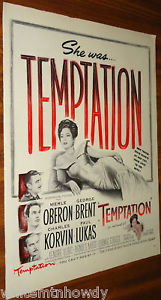
TEMPTATION
US, 1946, 92 minutes, Black and white.
Merle Oberon, George Brent, Charles Korvin, Paul Lukas, Arnold Moss, Ludwig Stossel.
Directed by Irving Pichel.
Temptation is a stylish melodrama of the mid-40s. It was written by the author of 'The Garden of Allah' and 'The Paradine Case', Robert Hichens.
The setting is Egypt about the turn of the century. The black and white photography captures the atmosphere of period. Merle Oberon is at her best in this kind of ambiguous good and bad woman role. Paul Lukas is the doctor, George Brent the stolid hero and Charles Korvin is the ambiguous other man. The material is familiar from any number of melodramas - but it is given stylish treatment with atmosphere, decor and costumes. Direction is by Irving Pichel who worked at Universal Studios with comedies and romances at this period.
1. Interesting and enjoyable period melodrama? Style?
2. Black and white photography, atmosphere of Egypt, period, decor and costumes, musical score?
3. The title and its relationship to Ruby? The men in her life? Good and evil?
4. The flashback structure: the focus on Ruby, audience sympathy, the arrival of the doctor, the arrival of the police, the revelation of the intricacies of relationships and scheming, murder?
5. The portrait of Ruby: Merle Oberon, her background, Egypt, widow, the relationship with her servant and eventually her servant turning against her, her wealthy life and style, the attraction towards the archeologist, the plan and her trapping him, her relationship with his daughter? Love for Nigel? Her relationship with the doctor and his knowledge of her scheme? The encounter with Barrudi, infatuation, jealousy? The plan to poison Nigell His illness? Her seeing through Barrudi and his plan? The arrival of the doctor? Her change of heart, killing Barrudi, helping Nigel, his future job? The confession to the doctor? Her going with the group to the Valley of the Kings, her accidental death? Her dying for love of Nigel? The full melodramatic style?
6. Barrudi, his background, style, infatuation with Ruby, the plan to kill Nigel, using the doctor, the poison? Ruby and her turning the tables on him, his own death?
7. Nigel, the archeologist, his skill as a scientist, the opening up of the tombs? A gentleman, his daughter? Trust, love for Ruby, hoping she would love him? His illness, the coming of the doctor? His being allowed to live? His grief for Ruby's death?
8. The doctor, his practice, friendship with Ruby, dislike of her, coming to help Nigel, the flashbacks and the truth? His telling the policeman the story of Ruby's accidental death?
9. The policeman, his admiration for Nigel, respect for Ruby, his dropping the charges?
10. Familiar intrigues and melodrama - enjoyable nonetheless?
Published in Movie Reviews
Published in
Movie Reviews
Tagged under
Saturday, 18 September 2021 19:44
Tender Comrade
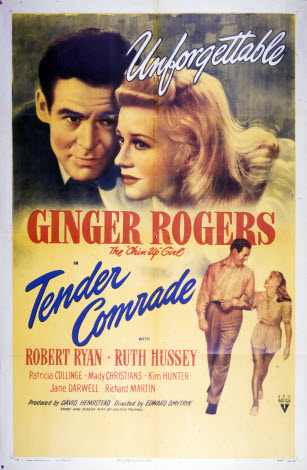
TENDER COMRADE
US, 1943, 101 minutes, Black and white.
Ginger Rogers, Robert Ryan, Ruth Hussey, Patricia Collinge, Mady Christians, Kim Hunter, Jane Darwell.
Directed by Edward Dmytryk.
Tender Comrade is emotional World War Two American propaganda. It was written by Dalton Trumbo and directed by Edward Dmytryk. Later, the film was interpreted as pro-socialist, pro-communist propaganda as the writer and the director were named amongst the Hollywood Ten.
However, it is a flag-waving sentimental movie, focusing on the wives left behind, their coping with the absence of their husbands, their work and their sharing a house together. Ginger Rogers is attractive as the star. A young Robert Ryan is the hero.
1. Interesting and enjoyable war propaganda? Sentiment? A picture of the times, now?
2. Black and white photography, the American cities during the war, the small American towns? Housing? Work? The musical score and its feeling?
3. The title coming from Robert Louis Stevenson? The relationship between husbands and wives? the men going to war? Women at home working and waiting?
4. The focus on Jo and Chris? The background of their being at school together, the note in class, Jo- eating it? Their growing up, flashbacks to the proposal, Jo's contrary attitude, Chris's insistence? The wedding? The early years of marriage? Ups and downs? Chris's enlisting? His night at home? The bond between the two? Jo and her work, friendships, the decision to live in the house together, setting it up, rules, approval and disapproval of each other's behaviour, the employing of Manya? The news of Barbara's husband's injuries? The telegram with Christ'S death? Her having the baby, the memory of Chris? The sentiment of the finale?
5. The sketches of the other women: Barbara and her toughness, flirting with the men at the factory, going out, the disapproval of Doris And the others? The'news about her husband's boat being attacked - and her standing on the staircase? Doris and her youthfulness, her engagement to Mike, her descriptions of the courtship and her acceptance, the 45minute marriage? His return and the women all feeding him with the food that their husbands liked? Helen and her age, experience, family and news? The employing of Manya - her experience, anti-Nazism, the German experience, democracy, her husband and his medal?
6. The interaction of the women: the indication of life at the time, the pressures, work in the factories, money, collaboration?
7. The sentiments of the pro-American speeches? Patriotism? Propaganda?
Published in Movie Reviews
Published in
Movie Reviews
Tagged under
Saturday, 18 September 2021 19:44
Terror of the Tongs, The
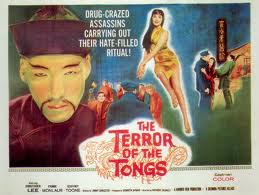
THE TERROR OF THE TONGS
UK, 1960, 79 minutes, Colour.
Geoffrey Toone, Christopher Lee, Brian Worth, Richard Leech.
Directed by Anthony Bushell.
The Terror of the Tongs is one of many horror films made at Hammer Studios during the '50s and '60s. Once again, Christopher Lee is the star. He is the head of the Red Dragon Tong, looking and sounding sinister - and anticipating his role in a few years afterwards of Fu Manchu.
The film is set in Hong Kong 1910, has an exotic atmosphere of the Tongs and their violence - although their behaviour resembles closely that of the American Mafia. There are dashes of sex and violence - early '60s style. However, in retrospect the film seems a colourful example of British adventure with the touch of horror. The film was written by Jimmy Sangster, regular writer for many Hammer films.
1. Entertaining British action thriller? settings? The mystique of the Tongs?
2. Colourful Hong Kong settings? Colour photography, the atmosphere of Hong Kong, the early 20th. century? British presence? The sea and traders? Ships? The headquarters of the Tongs? The violence? Musical score?
3. The title and its indication of themes, horror and terror?
4. The opening with the focus on Mr. Ming, his arrival in Hong Kong, the Captain and his involvement? Mr. Ming and his message, his being attacked at the wharf by the Tong member, his death, the consequences for the crew, the death ,of the Captain's daughter, his quest of vengeance?
5. The Red Dragon Tong - Christopher Lee as its head, tall and sinister, loyalty to the mainland,,- the violence, the exploitation of opium, prostitutes? The loyalty of the members of the Tong, the use of opium, the commission with the axe to go and kill as the culmination of life? The network of the Tongs' violence in Hong Kong, people's fear? The.turning against the Tongs at the end? The leaderls death at the hand of his henchman?
6. The Captain as the upright Englishman, with Mr. Ming, his love for his daughter, her death, his quest against the Tongs, seeking out information, Harcourt and his betrayal, the attacks by the Tongs, the girl and her friendship, attacking the doctor, helping him with his investigations, falling in love, her coming to warn him against Harcourt, her saving his life? The theme of the Englishman searching for vengeance, breaking the power of the Tongs?
7. The Chinese network, the elderly woman and her friendship with the Captain, the leader and his using the Captain to bring the crisis to a head?
8. The action sequences - attacks, violence, deaths? The final fight? The death of the leader?
9. The popularity of this kind of film - exotic action adventure? Resemblance to corrupt systems and networks in other countries (in, for example, the Mafia)? Justice, law and order, corruption, heroism?
Published in Movie Reviews
Published in
Movie Reviews
Tagged under
Saturday, 18 September 2021 19:44
That Touch of Mink
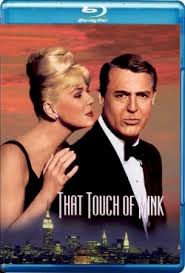
THAT TOUCH OF MINK
US, 1962, 99 minutes, Colour.
Cary Grant, Doris Day, Gig Young, Audrey Meadows, Dick Sargent, John Astin.
Directed by Delbert Mann.
That Touch of Mink is a Doris Day- Cary Grant starring vehicle. It is firmly in the tradition of the Doris Day- Rock Hudson films (Pillow Talk, Lover Come Back). In fact, writer Stanley Shapiro was the author of Pillow Talk. Director Delbert Mann made Lover Come Back. Doris Day was to appear in this kind of film during the '60s with such leading men as James Garner, Rod Taylor, Richard Harris.
The film is a piece of frothy '60s colour comedy - a battle of the sexes. It is reminiscent of the frothy, black and white comedies, battles of the sexes of the '30s. Gig Young enjoys himself as the other man and there is a very amusing performance by Audrey Meadows as Doris's girlfriend. The film, made in Panavision, has all the lush Universal production values of the period. While very much of its time, nevertheless this comedy still has many amusing moments.
1. The title of the film - romance, Battle of the sexes? affluence? A 1960s frothy comedy?
2. The popularity of the Doris Day vehicles of the period? Now? Doris as the hard-working girl, beleaguered by the men, potentially compromised, winning out against all odds?
3. Production values: Panavision colour photography? Costumes and decor? Affluence? Romantic musical score? Comic touches?
4. Cathy Timberlake and her being splashed by the passing car, her exasperation, her talking with Connie, the diner?The encounter with Roger? her exasperation with Philip Shayne - but falling for Cary Grant's presence and style? Her discussing issues with him, giving him financial brainwaves? The trip to Baltimore, Philadelphia? Platonic friendship? His proposal to go to Bermuda? Her resistance? Her decision to go? Her coming out in spots? Her getting drunk, falling off the balcony? Philip's antagonism?Her plan to make him jealous- her contact with Beasley (and the comic encounter at the beginning), the planned elopement, the motel, the chase? Philip's rescue and marriage - and the irony of his spot at the end? Doris Day as the virginal American heroine? The businesslike background, determined woman, romantic? Comic touches?
5. Cary Grant's suave presence as Philip Shayne: splashing Cathy ,driving on, his change of heart, relationship with Roger, sending him to seek her out? The anger at Cathy? Her falling in love with him? Impressed by her business ideas? On the trip? His falling in love with her? Bermuda and her spots? His frustration with her? His rescuing her from Beasley? His own spots? The typical Cary Grant businessman?
6. Roger and his love-hate relationship with Philip? Doing his bidding? The money, wanting to get out, staying? Arranging things? Cynical comic touches? His encounters with Connie - and the humorous slapstick?
7. Connie and her work, the meals, her thinking Roger was Phiilp and her antagonism towards him? The comedy with the meals? Her wisecracking hard-hitting advice? best friend? The tradition of the American battle of the sexes?
8. Dr. Gruber and psychoanalysis, Roger, using him for financial deals, the satire on psychoanalysis and greed?
9. Beasley and his lecherous behaviour at the employment office? Cathy's return to him and his foolish believing her, the trip to the motel, his comeuppance?
10. The popular blend of mistaken identities? farcical situations, bedroom comedy - in the lush '60s style?
Published in Movie Reviews
Published in
Movie Reviews
Tagged under
Saturday, 18 September 2021 19:44
They Found a Cave
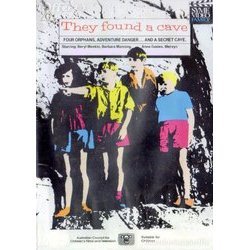
THEY FOUND A CAVE
Australia, 1962, 61 minutes, Colour.
Directed by Andrew Steane.
They Found a Cave is a pleasant, brief Australian children's film, one of the few made in Australia in the early '60s. It was made lin Tasmania and uses the local terrain to great advantage. Most of the cast are amateurs except for Beryl Meakin and Michael Boddy (later to be a food journalist). It is interesting to compare the quality of film-making with later Australian children's films - this was the era of developing television.
1. A popular children's film? Themes and characters?
2. The work of the Australian industry in the '60s? This being one of the few features made?
3. The use of Tasmanian locations, their beauty and ruggedness? The background of Peter Sculthorpe's score? The harmonica-playing by Larry Adler?
4. The basic situation and children identifying with it and with the characters?
5. The sketching of the children: the English orphans and the Tasmanian boy? Cherry, Nigel, Brick, Nippy? Their English background, orphans, not at home in Tasmania? Living with Jandie? Befriending Tas and his helping them? Their delight in the countryside, their escapades together, finding the cave? Their reaction to the Pinners? The raid and the adventure?
6. Tas as the local, the leader, his know-how, an engaging character? The orphant following him?
7. Jandie: nice, her home, the sheep, having to go to hospital, the Pinners and their plot?
8. The Pinners as the villains of the film? Their plot against Jandie, the chi,ldren knowing about it, taking the sheep, the build-up to the climax, the trick, the-police?
9. The enjoyment of the action sequences and the adventure? for children's entertainment? Popular ingredients?
Published in Movie Reviews
Published in
Movie Reviews
Tagged under
Saturday, 18 September 2021 19:44
They Shall Have Music
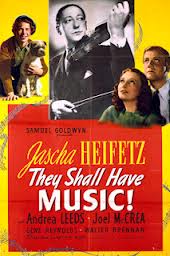
THEY SHALL HAVE MUSIC
US, 1939, 105 minutes, Black and white.
Joel Mc Crea, Jascha Heifetz, Walter Brennan, Andrea Leeds, Gene Reynolds, Terry Kilburn, Diana Lynn,
Porter Hall, (Dolly Loehr).
Directed by Archie Mayo.
They Shall Have Music was a popular entertainment of the late '30s. Directed by Archie Mayo, veteran of thrillers, gangster films and musicals, it capitalised on the interest of audiences in the popularizing of classical music. This had been a success with Deanna Durban and Leopold Stokowsky in One Hundred Men and a Girl. Producer Sam Goldwyn attempted his blending of the classics with the Dead End Kids.
Walter Brennan enjoys himself as an absent-minded professor of music, taking care of talented youngsters who have no money. Joel McCrea? and Andrea Leeds are a pleasant hero and heroine. There is a focus on dead-end kids, their lack of opportunity. Marjorie Main makes a sympathetic appearance as the mother of the central youngster, Frankie. However, the focus is on the violin-playing of Jascha Heifetz. He plays in recital, concerts and a film within a film.
1. Popular entertainment of the 1930s? The focus on classical music? The focus on slum kids and their opportunities, creativity?
2. Black and white photography, the atmosphere of New York, the slums, the world of concerts and entertainers, the business world? The importance of the music? The selection of classical music, the violin-playing of Jascha Heifetz? The playing of the children?
3. The title and its focus on music - its universality, available for all, especially the poor?
4. The Dead End Kids style opening? Frankie and the gang, their bullying? Frankie and the concern of his mother, protectiveness? The stepfather and his resentment, threatening Frankie with reform school? His father's violin? The encounter with the kids, their revenge on him? Limey and their going to the concert? Frankie caught up with the violin-playing? Running away from home, hiding, hungry, the being sheltered by Anne? Introduction to Professor Lawson, idiosyncratic playing with his tongue out, his involvement with the orchestra, training? The plans for the concert, playing for funds on the street, the encounter with Heifetz, the preparations for the concert, the film? His running away, his not wanting to be found to go to reform school, the boys stealing the precious violin? His returning it?, The happy ending?
5. Anne and her devotion to her father, her love for Peter, keeping the school going, concealing the truth about the funds, Mr. Flower and the instruments, the businessmen, the possibility of the Heifetz concert? Peter and his attempts to help the school? His being detained by the police? Romantic leads?
6. Professor Lawson, his music, care for the children, traning, oblivious of reality, Heifetz, the vindication of his school?
7. Jascha Heifetz as actor, celebrity, his involvement with the children, his overseas tours, the loss of his violin, care for the children, sending them the film, playing with them?
8. Mr. Flower and the selfish businessmen - their disdain for the school, concern about money, name-dropping with Haifetz? The mothers barricading the concert and preventing him entering?
9. The children and their talent, playing, singing? Getting funds for the school? The performance at the concert?
10. The slum boys and the stealing of the violin, the dilemma, returning it?
11. Attractive-and sentimental themes? The innate goodness of youngsters in impoverished circumstances? Their creativity and talent? A pleasand blend of classical music, popular themes and sentiment?
Published in Movie Reviews
Published in
Movie Reviews
Tagged under
Saturday, 18 September 2021 19:44
Turn the Key Softly
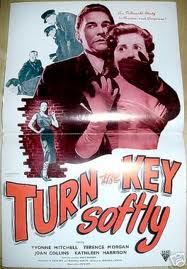
TURN THE KEY SOFTLY
UK, 1953, 81 minutes, Black and white.
Yvonne Mitchell, Terence Morgan, Joan Collins, Kathleen Harrison, Thora Hird, Dorothy Alison, Glyn Houston, Geoffrey Keen, Clive Morton.
Directed by Jack Lee.
Turn the Key Softly is a brief melodrama, slice of life so popular with British film-makers in the early '50s. It focuses on three women being released from jail and their first day out and the crises they have to face. Yvonne Mitchell brings dignity to her character. Kathleen Harrison is her usual engaging self. A very young Joan Collins is at the beginning of her career. Terence Morgan is a villain.
Direction is by Jack Lee (A Town Like Alice, The Shiralee). He aims for a blend of realism and a stylised look at life in London at the middle of the 20th century.
1. Enjoyable melodrama? Sketch of three women? A day in their lives?
2. Black and white photography? The life of the city? the worlds of the three women? The melodrama of the robbery attempt and the capture of Dave? Musical score?
3. The title, its focus, the women being released, Monica and the key? Freedom?
4. The three women being released: the attitude of the authorities, their getting their belongings back? Their being transformed and ready to face the world? Their leaving?
5. The. portrait of Alice: Yvonne Mitchell and her style, dignity? Her encounter with David and her love for him, her having gone to jail for him? His using her? Her attempt to get the job, the first refusal, the acceptance and her hopes? The dinner and her taking the two to the hotel, their enjoying their dinner? The encounter with the man in the street and her telling nim, her name was Stella? Her going to the theatre, Dave and his robbery plan? Her fears? Her decision to expose the leader, her finding the key, her watching them take him? her final comment about doing good and wrong? Her grief at the old lady's death, taking the dog?
5. Stella and her youth, hopes, meeting Bob, going to town, meeting her girlfriends, spending the money on the earrings, enjoying the dinner, meeting the man calling her Stella? His giving her the money? Her meeting Bob the possibilities for the future?
7. The old lady, her being frequently in jail, going home, finding her dog, taking him for a walk? Her daughter's surly attitude? Buying her the flowers? Her love for her granddaughter? Going to the dinner, taking the dog? Her enjoying herself? Going to the bar, the drink of ginger ale? Losing Johnny, asking the police, seeing him on the road, her death?
8. The sketch of Dave: his using Monica, his trying to persuade her by his advances? Promise of the theatre? The robbery, the chase on the roof and its melodrama? His being taken?
9. The problem of women coming out of prison, reputations, getting jobs?
10. The melodrama of the attempted robbery, the tire brigade and the police on the roof.
11. A slice of life? Insights into human nature?
Published in Movie Reviews
Published in
Movie Reviews
Tagged under
Saturday, 18 September 2021 19:44
Twins
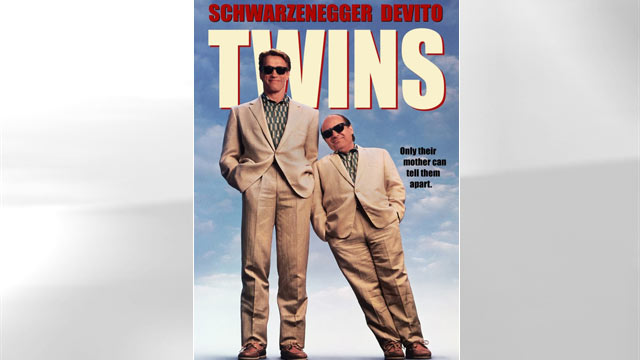
TWINS
US, 1988, 105 minutes, Colour.
Arnold Schwarzenegger, Danny de Vito, Kelly Preston, Chloe Webb, Bonnie Bartlett, David Caruso, Nehemiah Persoff, Hugh O’Brian?.
Directed by Ivan Reitman.
Twins is the result of a comic imaginative brainwave. What if Danny de Vito and Arnold Schwarzenegger were to star together - as identical twins?
On the whole the filn works quite well and is popular comedy. It takes note of genetic engineering - and the possibilities of things going wrong: the perfect specimen segregated from society and looked after by scientists, deceiving parents as well as brothers - and the other brother considered a reject. While the film emphasises comedy, there is a critique of aspects of genetic engineering. In fact, the film gets sentimental as the two brothers go on a quest to find their mother.
Danny de Vito does a variation on his small sleazy type theme (Ruthless People, Ronancing the Stone, Throw Momma from the Train). Arnold Schwarzennegger portrays the perfect specimen innocent - arriving in Los Angeles like an alien or Crocodile Dundee in New York. He shows a pleasant sense of humour that is only glimpsed in his action films.
Direction is by Ivan Reitman: Stripes, Legal Eagles, the Ghostbuster movies.
1. The idea for a comedy? Good idea? How well did it work?
2. The opening with the U.S. of the '50s, and the U.S. of the '80s?
3. Los Angeles, the American cities, New Mexico, Texas? The musical score and the songs? The mood?
4. Presuppositions in the audience about genetic engineering and experiments? Morality? heartless attitudes of scientists? rather and children?
5. The human repercussions for people?
6. The narrative voice-over about what happened: the choosing of the mother, the fathers, the genetic perfection, the visuals of the twins heing born and growing up, the taller and the shorter? The laughter but the consequences of their separation?
7. The deception for each of the brothers and the father, the results as they grew up? Their anger at the chief scientist?
8. Arnold Schwarzenegger as Julius: perfect specimen, on the island, completely isolated? His being told the story, his wanting to go to America, rowing away? His first plane flight and singing with the rock and roll music? His awkward clothes? Wandering Los Angeles and encountering criminals with innocence? Going to the jail and discovering Vincent, the interpretation of their situation and of Vincent's reaction? Getting him out and being ditched by Vincent? Encountering the thugs and arguing with logic, resisting violence but using it when necessary, saving Vincent? Learning how to drive the car and enjoying it? Going to the supermarket, meeting the girls? Ditched by Vincent again? His hopes to find their mother, the decision to go to New Mexico? The drive and their adventures? The girlfriend, the hotel, the sexual encounter and his smile? The finding of the professor and the laboratories, the confrontation, the truth? Going to find their mother, the encounter with the artist and the commune, her telling them the mother was dead? Their sense of failure? Vincent taking off, Julius with his intuitions about Vincent's plight, going by plane, taking the car (and giving restitution)? Stalking the criminal, saying Vincent? Meeting their mother, the reward of honesty in returning the money? nice and naive?
9. The contrast with Vincent and Danny de Vito's style: his cars, his debts, his girlfriend? Going to jail for the fines? The encounter with Julius and thinking he was just out of gaol and ditching him? The criminals pursuing him, saving bin? The meeting of the girls in the supermarket? The robbery, getting Vincent? The stealing of the car, the tape about Houston? The plan, going to travel? Forced to go with Julius and the girls? Mexico, his disbelief, the laboratories and the truth? Their going to find their father, his talking about his real self and sensing? The failure about their sister, his driving to Houston, the money, the deaths of the bosses? His being stalked by the killer, saved by Julius? His greed for money - and his delight about the $5,200,000, the irony of his keeping $I,000, though honest?
10. The girls and their work, confronting the thugs, their exasperation, being on the trip, their relationships with the brothers, sexuality? The narrations and their having tuins?
11. The thugs and their pursuit, comic criminals, victimising by Julius? chief thug and his job? Shooting the car-owners, stalking Vincent? His being scotheres?
12. Mother and her art, memories of the past, being deceived, reaction to the two men, the final reconciliation?
13. The sketch of the scientists, in themselves, the critique of their work and their dishonesty? American style comedy, laughs, rood, characters and issues?
Published in Movie Reviews
Published in
Movie Reviews
Tagged under